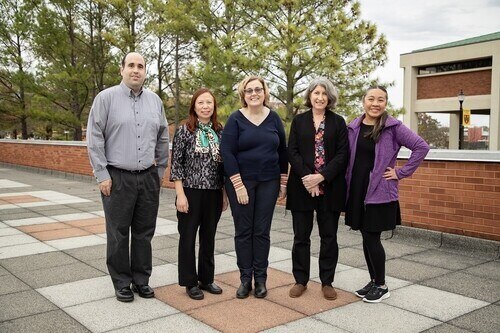Research team awarded National Science Foundation grant to study intersectionality on campus
By Dani Ray | Dec 11, 2023

MURRAY, Ky. – In August, the National Science Foundation (NSF) awarded ADVANCE, a Murray State University social science research team, a $195,000 grant to research intersectionality on campus.
The overarching goal of the work is to study the recruitment and retention of women faculty in STEM at Murray State, according to Dr. Maeve McCarthy, principal investigator for ADVANCE.
McCarthy said the grant is supplemental to an existing NSF ADVANCE Adaptation grant that the team received in 2019.
“The new supplemental funding is to study how gender issues intersect with other identities such as race, LGBTQ or disability status,” said McCarthy. “Our social science team will be conducting surveys, interviews and focus groups to study this. We will ultimately make some recommendations to the University based on our findings.”
Dr. Michael Bordieri, associate professor of psychology; Dr. Alexandra Hendley, associate professor of sociology and Dr. Diane Nititham, associate professor of sociology, will lead the research efforts.
Nititham said each method has its strengths and weaknesses, so they complement each other well.
All three of the lead researchers are involved in all of the research from start to finish, but each has a primary focus. Bordieri’s focus is on the survey, Nititham’s is on the interviews and Hendley’s is on the focus groups. The team has hired external consultants to protect the privacy of focus group participants, but Hendley has been involved in the planning and will be primarily responsible for analyzing that focus group data.
The sample size for most of the team’s research is small, and that is by design.
“Traditional quantitative research methods often overlook the experiences of faculty with marginalized identities, so our goal is to specifically recruit marginalized faculty to amplify their voices and focus on their experiences,” said Bordieri. “We aim to be inclusive in our research, so we also developed a survey that was sent to all faculty members at Murray State. We did this to ensure that we could hear from all faculty while also keeping our focus on faculty who have historically been understudied.
This research will allow the social science team to better understand how underrepresented groups on campus are treated.
“By having multiple methods of data collection, we can better contextualize the stories of our participants,” said Nititham. “Giving them the space to speak in different ways, whether through individual interviews, the survey, and/or focus groups, we can directly hear how they understand and respond to their experiences.”
Intersectionality broadly looks at how identities interact and the idea that individuals shouldn’t look at diversity through one lens. Intersectionality is an approach to exploring how facets of cultural identity can influence one’s experiences. ADVANCE started with a focus on increasing the representation and success of women in STEM careers, but in recent years it has taken a broader approach to diversity. Bordieri said the overall goal from their research is to learn from current faculty to better understand their perspective and needs.
“Our work is focused on exploring how race/ethnicity, LGBTQIA+, and disability identities intersect with marginalized gender to better understand the unique barriers and resiliencies of faculty with these intersecting identities,” said Bordieri. “ As an example, a faculty member who identifies as black and female might face additional barriers (e.g. sexism and racism) and have unique strengths and perspectives that are often not captured by traditional research approaches or initiatives that focus on a single identity in isolation.”
The group has started their research with approval from the Institutional Review Board (IRB). Bordieri said getting an IRB approved study is important, as they are dealing with sensitive information, and they will move forward in gathering research in multiple phases. One survey has already been released to all faculty members on campus, through the Provost’s Office.
Hendley said she hopes this research will contribute to making the University an even better place.
"Murray State aims to foster a diverse and inclusive environment, and taking steps to support its faculty is an important part of that goal,” said Hendley. “Our hope is that this research will offer insight as to how to best recruit and retain faculty, particularly those in underrepresented identity categories."
To learn more about ADVANCE research, visit murraystate.edu/advance.
